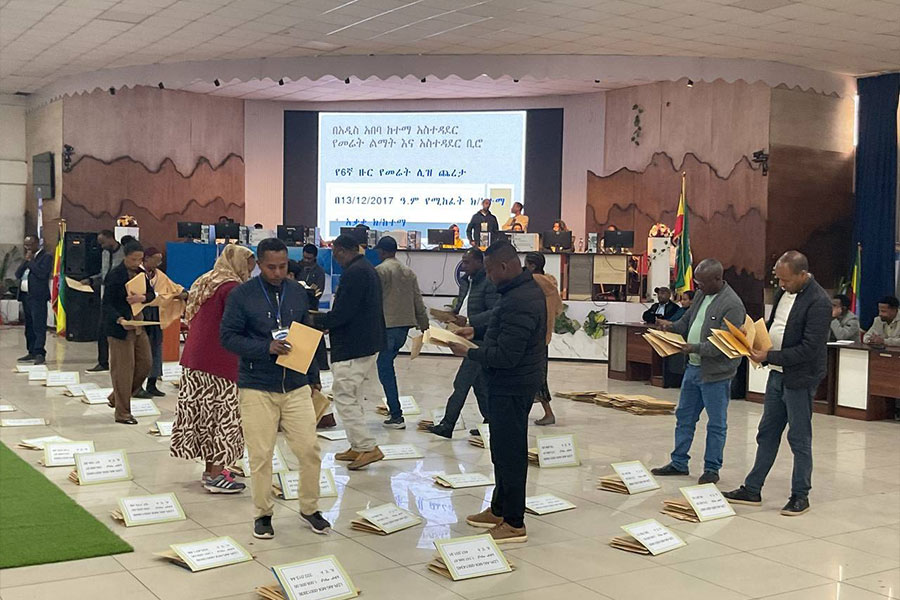
Photo Gallery | 153849 Views | May 06,2019
Feb 23 , 2025
By Shimelis Araya (PhD)
The global coffee trade has sharpened the focus on imbalances between producing and consuming countries. More than 90pc of the world’s coffee is grown in the global south, yet consumption remains predominantly a global north preoccupation.
In “The Coffee Paradox: Global Markets, Commodity Trade & The Elusive Promise of Development”, authors Benoit Daviron and Stefano Ponte revealed how a thriving coffee market in consuming countries contrasts with mounting crises in producing regions. They attribute the widening gap between the raw coffee bean price and the final product cost mainly attributed to oligopolistic rent captured by Western-based coffee roasting giants.
Regulatory measures in developed countries often distort trade relationships. A prime example is the European Union’s deforestation regulation (EUDR), which requires seven agricultural products, including coffee, to be certified deforestation-free before entering European markets. Developing countries, which contribute the least to global emissions, often bear the brunt of climate change and such regulations, leaving coffee-exporting countries among the most affected.
A study by the Overseas Development Institute (ODI), a London-based think-tank, exposed this disparity. It found that if Ethiopia’s coffee exports to the EU were halted under the EUDR, the country could lose its largest market. With 30pc of Ethiopian coffee bound for Europe, such a blow could spur an economic downturn, exacerbate poverty, and deepen inequality. Ensuring compliance, exploring alternate markets, and responding to the EUDR’s impact are now crucial to sustaining Ethiopia’s coffee sector.
The coffee industry also struggles with a marketing system deemed uncompetitive and exploitative. Critics charge international trade institutions with perpetuating neo-colonial dynamic that lets foreign companies extract value from developing countries’ resources and knowledge. The term “biopiracy,” coined by Canadian environmentalist Pat Mooney in 1993, refers to the illegal appropriation of biological resources and traditional knowledge through patent rights. Observers argue this occurs when those penalized for deforestation and emissions are also criminalized for safeguarding their resources, while foreign entities profit under the shield of trade rules.
A recent dispute to safeguard the interests of the country illustrates these concerns.
A German coffee buyer, Original Food GmbH, had been sourcing forest coffee from Ethiopia’s Kaffa and Bonga areas. The company allegedly claimed to be the exclusive buyer of coffee from those regions. It patented local names such as “Bonga Red Mountain” and “KaffaLand,” then sued other foreign and Ethiopian buyers of Kaffa coffee, asserting it held a legal permit in Ethiopia to monopolise sales in Europe.
Original Food’s ties with the Kaffa Forest Coffee Farmers Cooperative Union dated back 18 years, with the support of development cooperation agency operating locally, established to secure a stable supply of forest coffee. The company allegedly tried to dominate as a monopsonist buyer in Ethiopia as well as monopolize European sales by cultivating personal ties with cooperative union leaders, sometimes arranging visits abroad for them. Critics say this relationship led some of the cooperative unions' leaders to prioritise personal interests over those of their members, enabling uncompetitive sales practices and denying many farmers fair compensation.
On January 24, 2025, the Ethiopian Coffee & Tea Authority (ECTA) addressed the dispute in a statement. Working with the Ministry of Foreign Affairs, the Intellectual Property Protection Agency, the Federal Cooperatives Commission, and others, the Authority monitored the legal proceedings to counter Original Food’s monopolistic tactics and improper market behavior. After more than a year of litigation, the case was settled in Germany. After conducting the necessary assessment and providing evidence on the matter, the Authority banned the company from buying coffee in Ethiopia.
Armed with evidence from the Ethiopian government, the defendants successfully challenged Original Food in court, winning an acquittal. The firm’s owner apologized publicly, vowing to adopt more equitable marketing strategies. For Ethiopia, the ruling is a diplomatic success and a display of the Authority's resolve to safeguard fair market access and protect national economic interests.
Shimelis Araya (PhD) studied agricultural and development economics at the Justus Liebig University (JLU) Giessen, Germany, and works for the Development Bank of Ethiopia (DBE). He can be reached at araya.gedam@gmail.com.
PUBLISHED ON
Feb 23, 2025 [ VOL
25 , NO
1295]


Photo Gallery | 153849 Views | May 06,2019

Photo Gallery | 144092 Views | Apr 26,2019

My Opinion | 134844 Views | Aug 14,2021

Photo Gallery | 132284 Views | Oct 06,2021

Dec 22 , 2024 . By TIZITA SHEWAFERAW
Charged with transforming colossal state-owned enterprises into modern and competitiv...

Aug 18 , 2024 . By AKSAH ITALO
Although predictable Yonas Zerihun's job in the ride-hailing service is not immune to...

Jul 28 , 2024 . By TIZITA SHEWAFERAW
Unhabitual, perhaps too many, Samuel Gebreyohannes, 38, used to occasionally enjoy a couple of beers at breakfast. However, he recently swit...

Jul 13 , 2024 . By AKSAH ITALO
Investors who rely on tractors, trucks, and field vehicles for commuting, transporting commodities, and f...

Sep 6 , 2025
The dawn of a new year is more than a simple turning of the calendar. It is a moment...

Aug 30 , 2025
For Germans, Otto von Bismarck is first remembered as the architect of a unified nati...

Aug 23 , 2025
Banks have a new obsession. After decades chasing deposits and, more recently, digita...

Aug 16 , 2025
A decade ago, a case in the United States (US) jolted Wall Street. An ambulance opera...

Sep 7 , 2025 . By NAHOM AYELE
Addis Abeba's sixth public land lease auctions after a five-year pause delivered mixe...

Sep 7 , 2025 . By BEZAWIT HULUAGER
Brook Taye (PhD), the chief executive of the Ethiopian Investment Holdings (EIH), is...

Sep 7 , 2025 . By BEZAWIT HULUAGER
For decades, Shemiz Tera in the Addis Ketema District of Atena tera has been a thrivi...

Sep 7 , 2025 . By NAHOM AYELE
A dream of affordable homeownership has dissolved into a courtroom showdown for hundr...